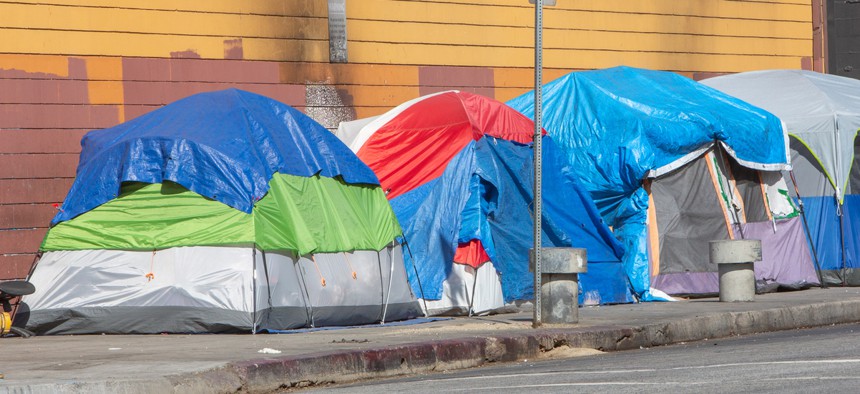
The Trump administration is reportedly interested in moving Skid Row residents to L.A.'s vacant Hawthorne Federal Building. Juan Llauro / Shutterstock.com
L.A. Wanted to Use This Building as a Shelter. Now Trump Does Too.
Los Angeles homeless providers were rebuffed when they asked to use the Hawthorne Federal Building, which the White House is eyeing to relocate Skid Row residents.
This week, senior Trump administration officials are making their way to Los Angeles as part of the president’s high-profile promise to intervene in California’s homelessness crisis. Federal officials are discussing the possibility of razing encampments and relocating hundreds or thousands of unhoused people—tactics that homeless advocates insist have no legal grounds under federal law.
One option under discussion is to use a former government building just outside Los Angeles to house (or detain) people now living in Skid Row in downtown L.A., where some 8,000 to 11,000 people are typically living on the streets. Federal officials have already reportedly toured the facility, the former West Coast headquarters of the Federal Aviation Administration, located 20 miles away in Hawthorne, California.
But a review of public records shows that the government previously rejected two efforts by advocacy groups to use the former Federal Aviation Administration building to serve the homeless.
Repurposing federal properties to provide homeless services isn’t a new or unprecedented idea: In fact, federal law already requires the government to make unused properties available to advocacy organizations that provide shelter or services to the homeless. Under the McKinney-Vento Homeless Assistance Act of 1987, the federal government must list surplus properties for consideration by shelter providers in a searchable database. A provision known as Title V states that properties must be made available—for no charge—to nonprofit groups, faith-based charities, local housing agencies, and other providers before they can be sold.

The Hawthorne Federal Building is the focus of the Trump administration’s plans for cracking down on the homeless in Los Angeles. (Google Maps)
The federal office building, which is called the Hawthorne Federal Building, was listed as eligible for use to shelter providers in 2016. A nonprofit organization that provides shelter for homeless veterans submitted an application that year to use the facility. The request was denied. Four months later, in January 2017, an organization that provides job training to people living on the margins inquired about using the building under the same Title V provision. At that time, however, they were told that the facility was no longer available.
Located in southwest Los Angeles County just south of Inglewood, the Hawthorne Federal Building has a high-design pedigree. It was designed by Cesár Pelli, the late architect who designed the Salesforce Tower in San Francisco, in 1966 and completed in 1972; the Late Modernist building is listed in the National Register of Historic Places. The General Services Administration put the building up for auction back in June. This auction generated intense interest, with 17 bids that grew from a starting price of $8 million to a closing bid, in July, of $55 million, according to records.
The current ownership status of the building is unknown. A GSA real-estate agent reached by telephone declined to comment. Rules on the GSA site read: “At the close of the auction, the high bid will be considered for acceptance by the Government. The Government reserves the right to reject any or all bids for any reason.”

Now the Pelli-designed government building could become a homeless shelter after all. Housing Secretary Ben Carson will be joining the delegation looking at federal solutions in L.A. this week, according to The Washington Post. And President Donald Trump, who is in California for fundraisers, may make an appearance—a reflection of the growing interest that the president and talking heads in conservative media have shown in highlighting urban homelessness as a way to thump liberal leaders in coastal cities.
But it’s not clear under what authority the Trump administration could relocate unhoused people from Skid Row to the Hawthorne Federal Building—or for that matter why it couldn’t be used by local providers to serve the same needs.
The fate of this unused building is a typical example in an ongoing turf war between shelter providers and the federal government. “Those properties can be used for anything from shelter to housing to job training to daycare sites,” says Maria Foscarinis, founder and executive director of the National Law Center on Homelessness and Poverty. “They are in fact being used, but not to the degree they should be.”
That’s because the Title V application process for service providers is onerous, and the federal government has wide discretion over what happens to its surplus properties, says Foscarinis, whose group has sought multiple injunctions to force the government to adhere to the law, most recently in 2013.
More than 500 surplus federal buildings have been successfully converted by homeless service providers and local government agencies into centers for meals, shelter, medical care, rehabilitation, and mental health treatment. These projects serve some 2.4 million Americans, according to Foscarinis, who was involved in writing the Reagan-era legislation. Notable Title V successes include the New England Center for Homeless Veterans in Boston, which serves more than 1,000 veterans each year, and Liberty House in Phoenixville, Pennsylvania, which has provided permanent housing for chronically homeless people facing mental health challenges for nearly 50 years.
Landholding agencies are reluctant to part with surplus properties, however, despite the mandate. The most recent estimate available from the Office of Management and Budget finds that federal agencies hold more than 100,000 unused or underused properties, a figure that is three times greater than the total number of properties listed under Title V between 1995 and 2011.
The Obama administration put a priority on tidying up the federal government’s inventory of property. But lately nonprofits and agencies looking to solve the housing crisis haven’t had much success using the program. Since January 2017, only 23 applications were made under Title V. Seven were approved, while 16 were denied. At least one homeless provider, the Colorado Coalition for the Homeless, sued the federal government after its Title V application for the Denver Federal Center, a 670-acre site, was denied. (A district court ruled for the defendants in July.)
One solution for the Hawthorne Federal Building might be to turn the property over to advocacy groups who have already expressed interest in using the facility to provide services for people without homes in L.A. With as many as 11,000 unsheltered people living in Skid Row, a six-story office building won’t make a dent in the homelessness crisis by itself. Other cities where many shelters have been disappearing from increasingly expensive downtown locations face a similar dilemma. But the Hawthorne Federal Building is only one example of surplus federal properties in the area.
Nor would a local solution satisfy the ulterior motives that critics fear the Trump administration harbors with its looming federal intervention in Los Angeles. Criminalizing the homeless is a strategy long favored by former New York City Mayor Rudolph Giuliani, who is involved with the administration’s current crackdown.
It might not be as dramatic as whatever the Trump administration is contemplating, or play as well with Tucker Carlson, but following existing federal law could be one way for the federal government to apply systemic solutions to the homelessness crisis. “Title V is not a panacea,” Foscarinis says. “It’s an important and vastly underused resource that could make a difference, potentially in Los Angeles and across the country.”






